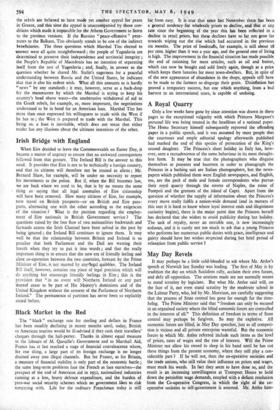Black Market in the Red
The " black " exchange rate for sterling and dollars in France has been steadily declining in recent months until, today, British or American tourists would be ill-advised if they cash their travellers' cheques through the hall-porter. Thanks in almost equal measure to the labours of M. Queuille's Government and to Marshall Aid, France has at last reached a stage of financial convalescence where, for one thing, a large part of its foreign exchange is no longer drained away into illegal channels. But for France, as for Britain, a measure of financial stability is only part of the economic battle ; the same long-term problems face the French as face ourselves—the prospect of the end of American aid in 1952, nationalised industries running at a loss, heavy defence expenditure, and the burden of post-war social security schemes which no government likes to risk tampering with. Life for the ordinary Frenchman today is still far from easy. It is true that since last November there has been a general tendency for wholesale prices to decline, and that at any rate since the beginning of the year this has been reflected in a decline in retail prices, but these declines have so far not gone far towards wiping out the rise which had occurred in the previous six months. The price of foodstuffs, for example, is still about per cent. higher than it was a year ago, and the general cost of living is high. The improvement in the financial situation has made possible the end of rationing for most articles, such as oil and butter, which can now be bought and sold freely again, though at a price which keeps them luxuries for most town-dwellers. But, in spite of of the new appearance of abundance in the shops, appeals still have to be made to the farmers to. disgorge their grain. Disinflation has proved a temporary success, but one which anything, from a bad harvest to an international scare, is capable of undoing.






































 Previous page
Previous page